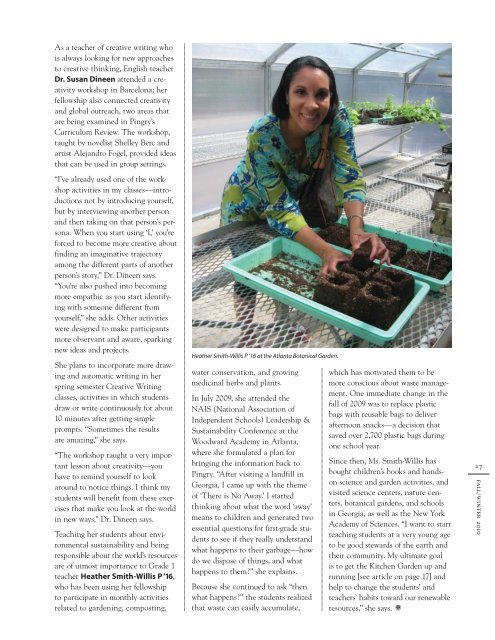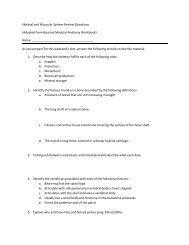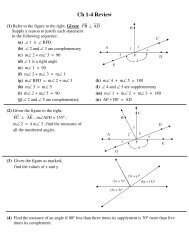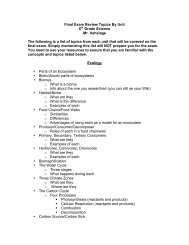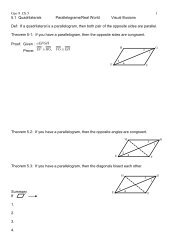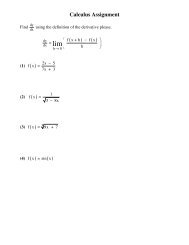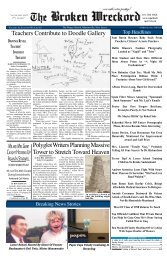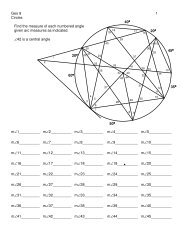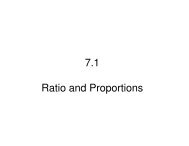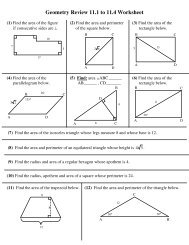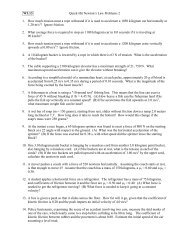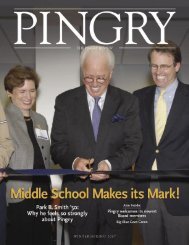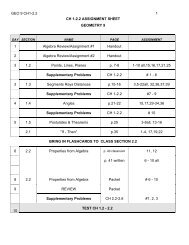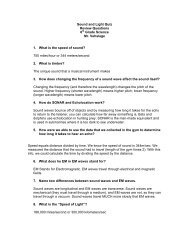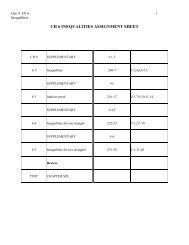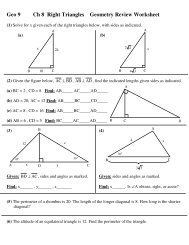Fall/Winter 2010 - Pingry School
Fall/Winter 2010 - Pingry School
Fall/Winter 2010 - Pingry School
You also want an ePaper? Increase the reach of your titles
YUMPU automatically turns print PDFs into web optimized ePapers that Google loves.
As a teacher of creative writing who<br />
is always looking for new approaches<br />
to creative thinking, English teacher<br />
Dr. Susan Dineen attended a creativity<br />
workshop in Barcelona; her<br />
fellowship also connected creativity<br />
and global outreach, two areas that<br />
are being examined in <strong>Pingry</strong>’s<br />
Curriculum Review. The workshop,<br />
taught by novelist Shelley Berc and<br />
artist Alejandro Fogel, provided ideas<br />
that can be used in group settings.<br />
“I’ve already used one of the workshop<br />
activities in my classes—introductions<br />
not by introducing yourself,<br />
but by interviewing another person<br />
and then taking on that person’s persona.<br />
When you start using ‘I,’ you’re<br />
forced to become more creative about<br />
finding an imaginative trajectory<br />
among the different parts of another<br />
person’s story,” Dr. Dineen says.<br />
“You’re also pushed into becoming<br />
more empathic as you start identifying<br />
with someone different from<br />
yourself,” she adds. Other activities<br />
were designed to make participants<br />
more observant and aware, sparking<br />
new ideas and projects.<br />
She plans to incorporate more drawing<br />
and automatic writing in her<br />
spring semester Creative Writing<br />
classes, activities in which students<br />
draw or write continuously for about<br />
10 minutes after getting simple<br />
prompts. “Sometimes the results<br />
are amazing,” she says.<br />
“The workshop taught a very important<br />
lesson about creativity—you<br />
have to remind yourself to look<br />
around to notice things. I think my<br />
students will benefit from these exercises<br />
that make you look at the world<br />
in new ways,” Dr. Dineen says.<br />
Teaching her students about environmental<br />
sustainability and being<br />
responsible about the world’s resources<br />
are of utmost importance to Grade 1<br />
teacher Heather Smith-Willis P ’16,<br />
who has been using her fellowship<br />
to participate in monthly activities<br />
related to gardening, composting,<br />
Heather Smith-Willis P ’16 at the Atlanta Botanical Garden.<br />
water conservation, and growing<br />
medicinal herbs and plants.<br />
In July 2009, she attended the<br />
NAIS (National Association of<br />
Independent <strong>School</strong>s) Leadership &<br />
Sustainability Conference at the<br />
Woodward Academy in Atlanta,<br />
where she formulated a plan for<br />
bringing the information back to<br />
<strong>Pingry</strong>. “After visiting a landfill in<br />
Georgia, I came up with the theme<br />
of ‘There is No Away.’ I started<br />
thinking about what the word ‘away’<br />
means to children and generated two<br />
essential questions for first-grade students<br />
to see if they really understand<br />
what happens to their garbage—how<br />
do we dispose of things, and what<br />
happens to them” she explains.<br />
Because she continued to ask “then<br />
what happens” the students realized<br />
that waste can easily accumulate,<br />
which has motivated them to be<br />
more conscious about waste management.<br />
One immediate change in the<br />
fall of 2009 was to replace plastic<br />
bags with reusable bags to deliver<br />
afternoon snacks—a decision that<br />
saved over 2,700 plastic bags during<br />
one school year.<br />
Since then, Ms. Smith-Willis has<br />
bought children’s books and handson<br />
science and garden activities, and<br />
visited science centers, nature centers,<br />
botanical gardens, and schools<br />
in Georgia, as well as the New York<br />
Academy of Sciences. “I want to start<br />
teaching students at a very young age<br />
to be good stewards of the earth and<br />
their community. My ultimate goal<br />
is to get the Kitchen Garden up and<br />
running [see article on page 17] and<br />
help to change the students’ and<br />
teachers’ habits toward our renewable<br />
resources,” she says.<br />
27<br />
fall/winter <strong>2010</strong>


